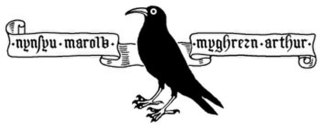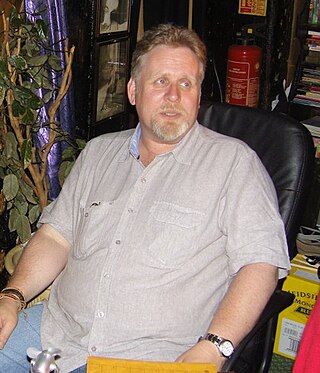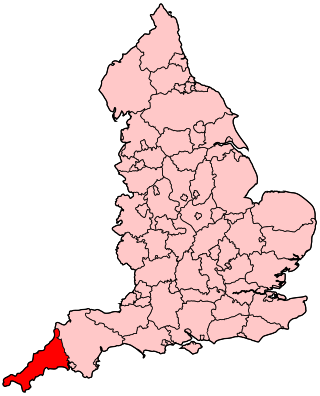Cornish is a Southwestern Brittonic language of the Celtic language family. Along with Welsh and Breton, Cornish is descended from the Common Brittonic language spoken throughout much of Great Britain before the English language came to dominate. For centuries, until it was pushed westwards by English, it was the main language of Cornwall, maintaining close links with its sister language Breton, with which it was mutually intelligible, perhaps even as long as Cornish continued to be spoken as a vernacular. Cornish continued to function as a common community language in parts of Cornwall until the mid 18th century, and there is some evidence for traditional speakers of the language persisting into the 19th century.
Nicholas Jonathan Anselm Williams, sometimes credited as N. J. A. Williams, is a leading expert and poet in the Cornish language.

Henry Jenner was a British scholar of the Celtic languages, a Cornish cultural activist, and the chief originator of the Cornish language revival.

The culture of Cornwall forms part of the culture of the United Kingdom, but has distinct customs, traditions and peculiarities. Cornwall has many strong local traditions. After many years of decline, Cornish culture has undergone a strong revival, and many groups exist to promote Cornwall's culture and language today.
Dalleth (beginning) was a support organisation for parents and families bringing up children to speak Cornish. It was set up in 1979. It organised camps and other children's activities, mostly during Cornish Language related events. It assisted in the production of books, songs and learning materials in Cornish, including translations from other Celtic languages. It published a magazine, Len ha Lyw. It also set up playgroups.

Cornish literature refers to written works in the Cornish language. The earliest surviving texts are in verse and date from the 14th century. There are virtually none from the 18th and 19th centuries but writing in revived forms of Cornish began in the early 20th century.
Robert Morton Nance (1873–1959) was a British writer and leading authority on the Cornish language, a nautical archaeologist, and joint founder of the Old Cornwall Society.

The Federation of Old Cornwall Societies (FOCS) was formed in 1924, on the initiative of Robert Morton Nance, with the objective of collecting and maintaining "all those ancient things that make the spirit of Cornwall — its traditions, its old words and ways, and what remains to it of its Celtic language and nationality". The motto of the federation—as written on their web site—is "Cuntelleugh an brewyon ues gesys na vo kellys travyth", which translated into English is "Gather ye the fragments that are left, that nothing be lost". The motto in the OCS logo is the Cornish phrase King Arthur is not dead. The first Old Cornwall Society was established by Robert Morton Nance in St Ives in 1920.
Kesva an Taves Kernewek is an organisation that promotes the Cornish language. It was founded in 1967 by Gorseth Kernow and the Federation of Old Cornwall Societies. It is represented on the official language body, the Cornish Language Partnership.

Michael Kenneth Paynter is a retired Cornish civil servant, trade union activist, and poet. Apart from a period of study at the University of Newcastle, he has lived in St Ives.
AberFest is a Celtic cultural festival celebrating all things Cornish and Breton that takes place every second year in Cornwall, UK, around Easter. The AberFest Festival alternates with the Breizh – Kernow Festival which is held in Brandivy or Bignan in Brittany, alternating between those two Breton locations.
The Standard Written Form or SWF of the Cornish language is an orthography standard that is designed to "provide public bodies and the educational system with a universally acceptable, inclusive, and neutral orthography". It was the outcome of a process initiated by the creation of the public body Cornish Language Partnership, which identified a need to agree on a single standard orthography in order to end previous orthographical disagreements, secure government funding, and increase the use of Cornish in Cornwall.

Stevyn Colgan is a British writer, artist and speaker.

The Cornish Language Partnership was a representative body that was set up in Cornwall, England, United Kingdom, in 2005 to promote and develop the use of the Cornish language. and was dissolved in 2015. It was a public and voluntary sector partnership and consisted of representatives from various Cornish language societies, Cornish cultural and economic organisations and local government in Cornwall. The organisation was part-funded by the European Union's Objective One programme, the United Kingdom government's Department for Communities and Local Government and Cornwall Council.
The Cornish dialect is a dialect of English spoken in Cornwall by Cornish people. Dialectal English spoken in Cornwall is to some extent influenced by Cornish grammar, and often includes words derived from the Cornish language. The Cornish language is a Celtic language of the Brythonic branch, as are the Welsh and Breton languages. In addition to the distinctive words and grammar, there are a variety of accents found within Cornwall from the north coast to that of the south coast and from east to west Cornwall. Typically, the accent is more divergent from Standard British English the further west through Cornwall one travels. The speech of the various parishes being to some extent different from the others was described by John T. Tregellas and Thomas Quiller Couch towards the end of the 19th century. Tregellas wrote of the differences as he understood them and Couch suggested the parliamentary constituency boundary between the East and West constituencies, from Crantock to Veryan, as roughly the border between eastern and western dialects. To this day, the towns of Bodmin and Lostwithiel as well as Bodmin Moor are considered the boundary.
Arthur Saxon Dennett Smith was a Cornish bard, writer and linguist, known by the bardic name Caradar. He taught Modern Languages at Blundell's School, Tiverton, Devon. He was born in Hurstpierpoint, Sussex, England, of Cornish parents, Harriet Annie and Arthur Smith, and became a collaborator with Robert Morton Nance and Henry Jenner on the Gerlyver noweth Kernewek ha Sawsnek. He compiled several grammars to make learning Cornish easier and edited some of the surviving Cornish texts. He also wrote an important series of books aimed at teaching Welsh to English speakers. In 1927, he married Dorothea Sophia Bazeley. He died in Worthing and is buried at Amberley, Sussex.
The Cornish language revival is an ongoing process to revive the use of the Cornish language of Cornwall, England. The Cornish language's disappearance began to hasten during the 13th century, but its decline began with the spread of Old English in the 5th and 6th centuries. The last reported person to have full knowledge of a traditional form of Cornish, John Davey, died in 1891. The revival movement started in the late 19th century as a result of antiquarian and academic interest in the language, which was already extinct, and also as a result of the Celtic revival movement. In 2009, UNESCO changed its classification of Cornish from "extinct" to "critically endangered", seen as a milestone for the revival of the language.

The following outline is provided as an overview of and topical guide to Cornwall: Cornwall – ceremonial county and unitary authority area of England within the United Kingdom. Cornwall is a peninsula bordered to the north and west by the Celtic Sea, to the south by the English Channel, and to the east by the county of Devon, over the River Tamar. Cornwall is also a royal duchy of the United Kingdom. It has an estimated population of half a million and it has its own distinctive history and culture.
Presented below is an alphabetical index of articles related to Cornwall:







